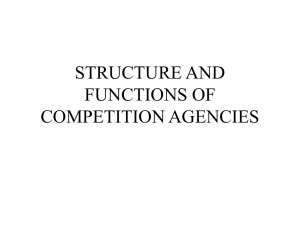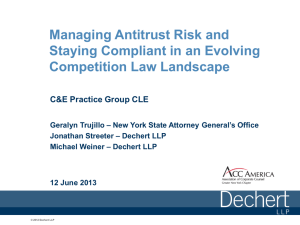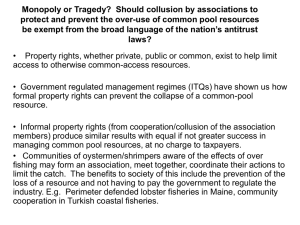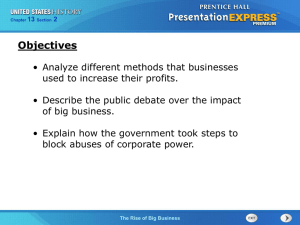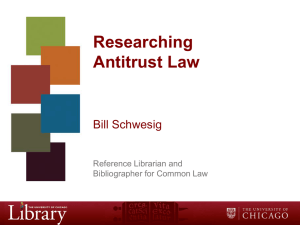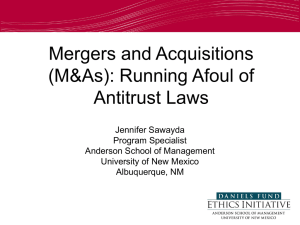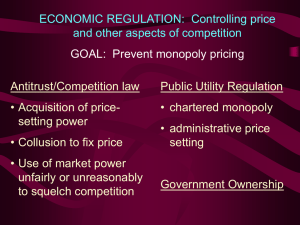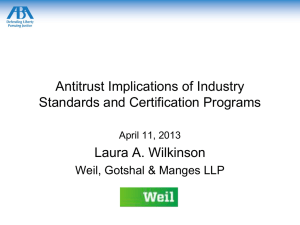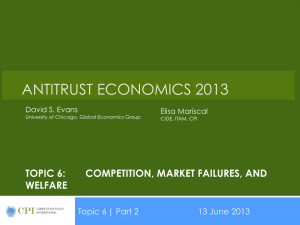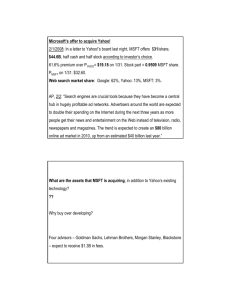Global Antitrust - International Trade Relations
advertisement
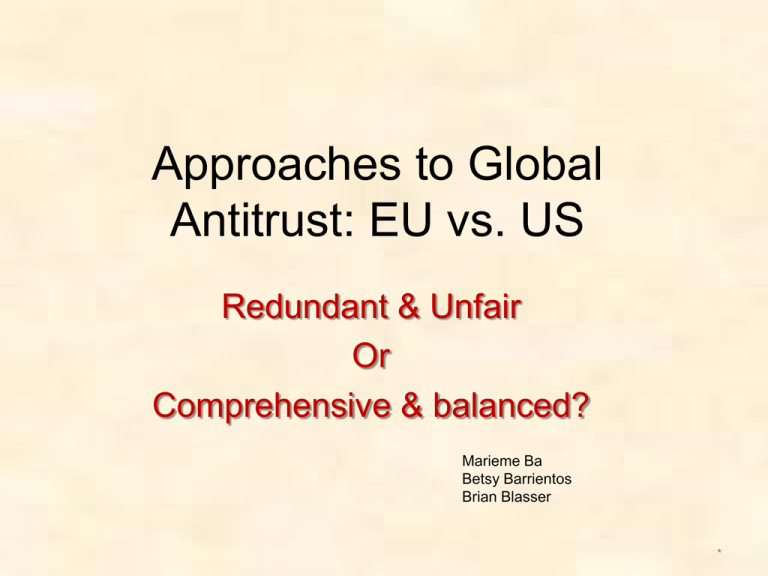
Approaches to Global Antitrust: EU vs. US Redundant & Unfair Or Comprehensive & balanced? Marieme Ba Betsy Barrientos Brian Blasser * Overview 1890 - The Sherman Act "every contract, combination in the form of trust of otherwise, or conspiracy, in restraint of trade or commerce among several States or with foreign nations." -§1 "...monopolize, or attempt to monopolize, or combine with any other person or persons, to monopolize any part of the trade or commerce among the several States, or with foreign nations..." -§2 * Sherman Act •Protect consumers from monopolies and cartels •Conduct that restrains trade or conduct that creates a monopoly •Enforced by Antitrust Division, Department of Justice * 1914 - The Clayton Act Prohibits acquisitions of stock or assets where “the effect of such acquisition may be substantially to lessen competition, or to tend to create a monopoly.” § 7 • Addresses mergers and joint ventures, price fixing, price discrimination, exclusive deals arrangements, "tying" of products * Clayton Act •Significant as it questioned the harms of increased concentration of market share and its effects on competition. - horizontal mergers vs vertical acquisitions •Enforcement - Antitrust Department, Department of Justice - Federal Trade Commission (FTC) - State Attorneys General - Private Lawsuits (damages awards can be high) * 1914 - Federal Trade Commission Act •Prohibits “unfair methods of competition” and “unfair or deceptive acts or practices” - § 5 •Established the Federal Trade Commission (FTC) to challenge unfair competition •Power to enforce Clayton Act •Focused also on consumer protection issues: • false advertising in foods, drugs, and cosmetic products • credit: lending practices such as billing, reporting; and equal credit opportunity • health warnings in tobacco products * Antitrust • Protection of competitively of markets. The laws are intended to promote healthy market competition and encourage the production of quality goods and services at the lowest prices. • Applicable because of flexibility and vagueness. • No precise guidance on what constitutes illegal conduct and reach of law outside US territory. Defined in court on a case by case basis. • • • per se rule of reason Enforced by both Antitrust Division of DoJ and FTC. However, cases brought up by private firms continue to increase. * International Agreements • 1957 - Treaty of Rome (EU) Title V: Common Rules on Competition, Taxation and Approximation of Laws • 1982 - US Foreign Trade Antitrust Act • 1991 - US-EU Antitrust Agreement 1994 - US Int’l Antitrust Enforcement Assistance Act • 1998 - US-EU Positive Comity Agreement • • 2002 - International Competition Network Formation Also, US bilateral agreements within framework of NAFTA * Landmark Cases • 1909 - American Banana Co v. United Fruit Co • 1911 - Standard Oil v. US • 1945 - US v. Aluminum Co of America (Alcoa) Alcoa Effects Test: US Courts have jurisdiction if acts have effects within US territory • 1976 - Timberlane Lumber Co v. Bank of America • 2001 - GE-Honeywell v. US • 2006 - Maytag-Whirlpool v. US • current- US v. Google and ITA Software * US Gov’t/Microsoft Pretrial History •1991 FTC inquiry on MS-DOS Monopoly •1993 2-2 deadlock •Microsoft Licensing Agreements with PC Manufacturers – 1993 •1993 DOJ opens investigation •1994 Settlement w/ Consent Decree. -No bundling products but free to integrate features. •1995 integrates ‘feature’ Internet Explorer * US DOJ vs Microsoft •May 1998 DOJ & AGs of 20 states sue MSFT thwarting competition to protect SW monopoly. •October 1998 DOJ sues MSFT for violating 1994 Consent Decree because of Internet Explorer. •Damning testimony and emails show MSFT tried to destroy Netscape competition. •MSFT claims lower bundling costs & network effects help consumers. •Claims it can’t remove IE without substantially affecting underlying SW. * United States vs Microsoft •Economists complain rivals like Norvell, Oracle, and others pushed DOJ to hurt MSFT as corporate strategy. •Noted no price increase in SW & increased quality. •Hard to access monopoly rents from zero marginal price. •November 1999 District Court Judge Penfield Jackson rules against MSFT. Breakup company into two: Windows and Apps * US Appeals Process •In 2000, MSFT send to Supreme Court kicked to Federal Appeals Court •In 2001, Judge Kollar-Kotelly rules against breakup. •MSFT must disclose SW interfaces with others w a panel to oversee enforcement. •9 of the 20 states sought further remedies since punishment didn’t change MSFT behavior. •2004 Appeals court approved DOJ settlement. * EU vs Microsoft •In 2000, Statement of Objectives per Sun Microsystem Complaint, Java coding. •In 2001, Statement of Objectives. Windows Media Player Bundling Issue. •EU saw US appeal settlement as weak and ineffective. •In 2004, EU fines MSFT record $612 million. •MSFT must offer windows w/o media player option. And disclose coding information to rivals * EU vs Microsoft part 2 •MSFT pays fine and discloses information following requirements but EU claims coding specs insufficient. •IN 2006, EU fines MSFT $450 million, and $2.4 million a day with increase to $4.8 if still not compliant. •In 2007, MSFT loses appeal in European Court of First Instance (ECFI). •Decided against bringing it to the highest court: European Court of Justice •In 2008, MSFT fined additional $1.45 billion for noncompliance to 2004 decision. •In 2009, MSFT complies & unbundles internet explorer for EU product. * Comparison of the Two Trustbusters United States • Transparent & Open • Court Hearings • Independent Judges • Consumer welfare focus • Allows more time for preparing cases. • More empirical approach • More big business friendly • FTC, DOJ, Private Litigation European Union • Rivals can secretly disclose evidence. • Commissioner misses hearings. • Prosecutor, Judge, & Jury • ECFI doesn’t retry or see new evidence. Up or down vote on EC and defers to EC on complex issues • More analytical approach • Concerned more w/ market dominance than consumer welfare. * US EU Agreements •1991 U.S.-EC Agreement on the Application of their Competition Laws •Agreement Between the Government of the United States of America and the Commission of the European Communities Regarding the Application of Their Competition Laws, 1995 •Best Practices Concerning Bilateral Co-operation in Merger Cases of 2002 •E.U.-U.S. Merger Working Group, in which high level officials from the FTC, the DOJ and the EC * Policy Proposal •A stronger regional agreement between the EU and US versus Global Antitrust agreement PROS: Regional CONS: Global –House an Antitrust Authority inside either the WTO or OECD Closely aligned antitrust Interest Poorly structured to manage global antirust policy successfully Increase cooperation between the two authorities Difference between institutional Norms and the need of the system Highlighted the inefficiencies in a system based only on national borders Undermined the diplomatic style missions of the WTO and OECD * Policy Proposal •A new world government court akin to International Criminal Court for Antitrust Cases Pros Cons Mutually acceptable international Antitrust Increase protection of national sovereignty Increase extraterritoriality Dominance of US and EU in the global Antitrust System More efficient way to bring in action against domestic firm by Foreign Antitrust Authority Other countries would bear the disproportionate burdens * Counter-Arguments •Idealistic Goals of a single global antitrust authority continue to butt up against the realities of a global system still based on interactions among nations-states. •Global Antitrust agreements should be disregarded as unachievable in practice— we should instead focus on regional agreements and applications of extraterritoriality * Impact of Proposal on US Trade Policies * Impact of Proposal on Private Sector * Works Cited •"Antitrust in the European Union Unchained Watchdog." The Economist 18 Feb. 2010. Print. •"Antitrust Maturing Monopoly Europe Gets Tougher with Microsoft." The Economist 7 Aug. 2003. Print. •"Antitrust The Unusual Suspects." The Economist 6 July 2006. Print. •Economides, Nicholas, and Ioannis Lianos. "The Elusive Antitrust Standard on Bundling in Europe and in the UNited States in the Aftermath of the Microsoft Case." Antitrust Law Journal 76.3 (2009). Print. •"The EU and Competition A Real Monti?" The Economist 19 Aug. 2004. Print. •"European Antitrust Policy Competing Visions." The Economist 13 June 2002. Print. •"Global Antitrust and the Evolution of an International Standard." Vanderbuilt Journal of Transnational Law 35 (2002): 989-1017. Print. •"Improving European Antitrust The EU’s Policy Needs Reform. But Not in the Way the European Commission Is Proposing." The Economist 20 Jan. 2000. Print. •"Microsoft and Antitrust The End, Sort of." The Economist 16 Dec. 2009. Print. •"Microsoft on Trial." The Economist 28 Apr. 2006. Print. •"Technology Firms and Antitrust Here We Go Again." The Economist 17 Dec. 2009. Print. •https://www.competitionpolicyinternational.com/ * •https://docs.google.com/viewer?a=v&q=cache:VHkcN1oAS9cJ:law.vanderbilt.edu/publications/journal Works Cited cont. •https://www.competitionpolicyinternational.com/ •https://docs.google.com/viewer?a=v&q=cache:VHkcN1oAS9cJ:law.vanderbilt.edu/publications/journal-of-transnationallaw/archives/volume-35-number4/download.aspx%3Fid%3D1817+&hl=en&gl=us&pid=bl&srcid=ADGEESjYpDgJPf6yvQufy8_QMMcjjiy-ugjCrb_w_KY2tqa-sFtMtlwC63HzDFlISoXb9O6kzafiteC0BGV20XGk8HxtcWyE4mXkMwMnNZsaKO4IS1y_0C_1UjVcz-GMsHhWj_RmgD&sig=AHIEtbRRkSrPXVB5vnyMxRqhbigiFG_Oug •http://www.techpolicy.com/Media/Fact-Sheets/Global-Antitrust-%28Competition%29.aspx •http://law.fordham.edu/fordham-competition-law-institute/fcli.htm •international antitrust law policy •https://docs.google.com/viewer?a=v&q=cache:UJ6VWK5hkAJ:www.justice.gov/atr/public/speeches/3952.pdf+&hl=en&gl=us&pid=bl&srcid=ADGEESh5gFcBGSKWSX6qLEtkGP40i2OurDI8 rineHxX0iBag_mdMLHdyOsg7wMTNEw6huluWPUGB3TGJ35h46Gwqno53x_7OsDmd1uOhVtThZ32FlhFINylkZhjbvEUfDPlgs2iikv0&sig=AHIEtbTJnGFrdYuroQeQOAunarJkINbXjQ •http://chillingcompetition.com/2011/06/10/38th-annual-conference-on-international-antitrust-law-and-policy-a-virtual-seat-forchillincompetition-readers/ •http://www.cfr.org/industrial-policy/international-antitrust-law-policy-opportunities-greater-convergence/p20385 *
